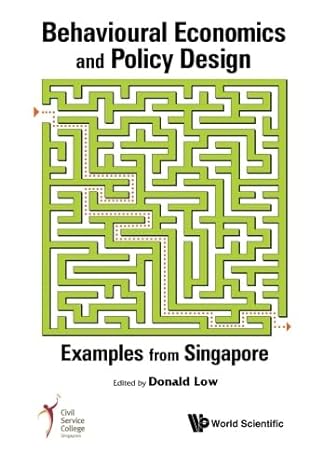Go back


Behavioural Economics And Policy Design Examples From Singapore(1st Edition)
Authors:
Donald Low

Cover Type:Hardcover
Condition:Used
In Stock
Include with your book
Free shipping: April 04, 2024Popular items with books
Access to 3 Million+ solutions
Free ✝
Ask 10 Questions from expert
200,000+ Expert answers
✝ 7 days-trial
Total Price:
$0
List Price: $54.75
Savings: $54.75(100%)
Book details
ISBN: B00GRRNZKC
Book publisher: Wspc (October 18, 2011)
Get your hands on the best-selling book Behavioural Economics And Policy Design Examples From Singapore 1st Edition for free. Feed your curiosity and let your imagination soar with the best stories coming out to you without hefty price tags. Browse SolutionInn to discover a treasure trove of fiction and non-fiction books where every page leads the reader to an undiscovered world. Start your literary adventure right away and also enjoy free shipping of these complimentary books to your door.
Behavioural Economics And Policy Design Examples From Singapore 1st Edition Summary: Analysts of government have frequently noted how Singapore's policies are grounded in rigorous economics thinking. Policies are designed to be economically efficient even if they are not always popular. This pioneering book takes a different approach. It aims to demonstrate how successful policies in Singapore have integrated conventional economic principles with insights from the emerging field of behavioural economics even before the latter became popular. Using examples from various policy domains, it shows how good policy design often requires a synthesis of insights from economics and psychology. Policies should not only be compatible with economic incentives, but should also be sensitive to the cognitive abilities, limitations and biases of citizens. Written by policy practitioners in the Singapore government, this book is an important introduction to how behavioural economics and the findings from cognitive psychology can be intelligently applied to the design of public policies. As one of the few books written on the subject, it promises to stimulate wider interest in the subject among researchers, policymakers and anyone interested in the design of effective public policies.
Customers also bought these books
Frequently Bought Together
Top Reviews for Books
Flo daniels
( 5 )
"Delivery was considerably fast, and the book I received was in a good condition."










